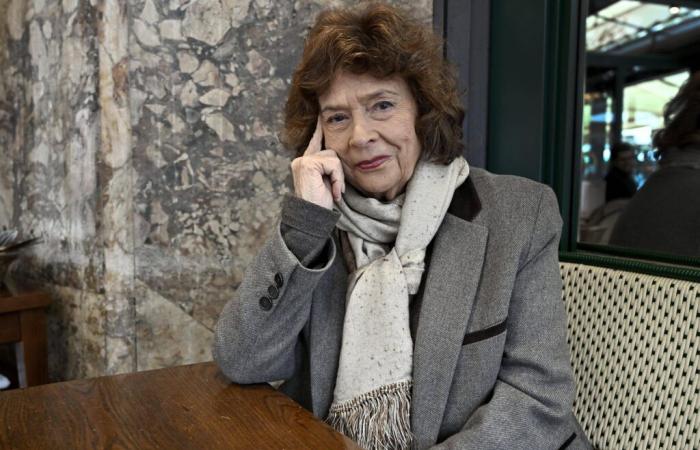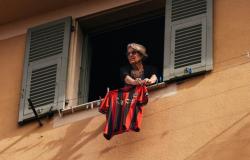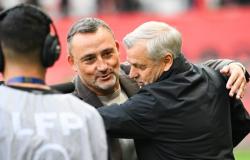You liked My Fifththe first volume of Michèle Cotta's memories published last year? You will love it The Last Greats (1), the second volume dedicated to the period 1981-2002. The journalist, daughter of the first mayor of Nice elected after the Liberation, recounts the beginnings of the left in power, the cohabitations, then the two mandates of Jacques Chirac at the Élysée. Sometimes an observer, sometimes an actress, always lucid, she sheds light on the events that shaped the France of today.
On May 10, 1981, François Mitterrand was elected President of the Republic. How did you feel that day?
It was a political earthquake. The alternation aroused both excitement and great concern. Everyone wondered if a left-wing President would be able to “flow” into the Constitution designed for General de Gaulle. Although I had known Mitterrand for more than twenty years, I asked myself the same questions as all my colleagues.
What were the relations between your father (2) and François Mitterrand?
They had met in 1954, during a visit by my father to Paris. This did not lead to a lasting relationship. [Un silence] Like many socialists, my father was suspicious of him. But he would have been happy to see the left come to power.
In July 1981, you were appointed president of Radio France. Did you hesitate before accepting this challenge?
[Elle soupire] No. I didn't realize the scale of the challenge that awaited me. I thought it was, more or less, about running a big editorial office. Whereas Radio France was several stations, two orchestras… My predecessor, Jacqueline Baudrier, kindly warned me: “We barely have time to listen to the radio.”
You were greeted as a government envoy mandated to lead a “witch hunt”…
However, I kept most of the previous team by my side! With the exception of the journalist Michel Droit (3) and the director of France Musique, Pierre Vozlinsky, who voluntarily caused his departure. I was also criticized for not having gone far enough. I also had to implement the 39-hour week with very virulent unions, determined to take advantage of the historic victory of the left.
In 1982, you agreed to chair the High Authority for Audiovisual Communication [ancêtre du CSA et de l’Arcom, Ndlr]. Did you really think you had the means to exercise your prerogatives?
Yes, I believed it. And in a way, I did. We initiated the movement which means that today, state supervision has disappeared. We created the first rules to control speaking time on air, encouraged by Mitterrand who felt – rightly – that he had been mistreated by television for 23 years.
François Mitterrand's attitude towards you is surprising. He sometimes seemed annoyed, sometimes amused by your frankness…
He was more often irritated than amused. [Elle sourit] What really posed a problem was the appointment of the channel presidents. François Mitterrand sincerely believed, like most political leaders of his time, that television had the power to guide voters. However, with the proliferation of live reports, it was no longer possible to control the information.
Your story does not spare Laurent Fabius. Was your relationship difficult?
He was a brilliant young man, who influenced all the decisions taken by the President since 1981. But when he was appointed to Matignon in 1984, two years before the legislative elections, he was one of those who thought that we could influence on the vote of the French by changing the managers of the antennas. He assumed that since the state financed the public channels, it had a say in everything that concerned them. The clash was inevitable…
In 1986, when everyone expected Antenne 2 to be privatized [actuelle France 2, Ndlr]you suggest to Jacques Chirac to sell TF1. Have you ever regretted this choice?
Never. Antenne 2 was the jewel of the public service: abundant, inventive, but more elitist. While TF1, largely financed by advertising, was already targeting the general public by programming games and variety shows. The transition to the private sector would have been more difficult for the second channel.
Upon his return to Matignon, Chirac abolished the High Authority. You are forced to return to your real job. Was the “return to business” complicated?
Yes. I realized that, among my “amis” journalists, many had not accepted my journey. They made me pay for it; I had a very difficult six months.
Director of information at TF1 between 1987 and 1993, were you free to make your editorial choices?
Absolutely! Francis Bouygues, who had just bought the chain, was exemplary. Back in power, Chirac complained to him about “treatment” that the editorial staff of TF1 subjected him to. He threatened to exclude Bouygues from all major projects in the City of Paris. Francis did not give in. He told me: “Be independent, I’ll take care of the rest.”
The 8 p.m. news was then presented by Patrick Poivre d'Arvor. Did you never hear of the facts he was accused of much later?
Never! I swear! It's all the more surprising since, as a woman, it would undoubtedly have been easier to come and talk to me. This shows how different the period was. It was not until the 2000s that the behavior of certain men could be denounced.
If you had known, what would you have done?
What is necessary to stop this! When PPDA was implicated in the Botton affair (4), I notified him of his dismissal. He was saved by Martin Bouygues, who had just succeeded his father and disowned me. Which caused my departure from TF1.
Which cohabitation was crueler: that of Mitterrand with Jacques Chirac… or that of Mitterrand with Michel Rocard?
Mitterrand took advantage of Chirac's mistakes. The situation was different with Rocard. The President appointed him thinking he wouldn't hold up. However, he was its most popular Prime Minister. Between these two men who were completely opposed to each other, cohabitation – if we can use that term – was more subtle, less direct but just as violent.
How do you view the situation in the country in 2024?
It is very worrying. The existence of two extremes, left and right, which can sometimes combine their efforts, is very burdensome for those in power. France seems extremely fragile. Getting out of this rut will be very difficult…
1. The Last Greats by Michèle Cotta, Plon editions, 416 pages, 23 euros.
2. Jacques Cotta, SFIO mayor of Nice from 1945 to 1947, died on February 26, 1971.
3. General de Gaulle's favorite interlocutor during live television interviews from the Élysée, Michel Droit was often ridiculed for his excessive reverence towards the head of state.
4. Patrick Poivre d'Arvor benefited, between 1987 and 1990, from trips and stays offered by businessman Pierre Botton. He was sentenced in January 1996 to 15 months in prison and a fine of 200,000 francs for concealment of misuse of company assets.






